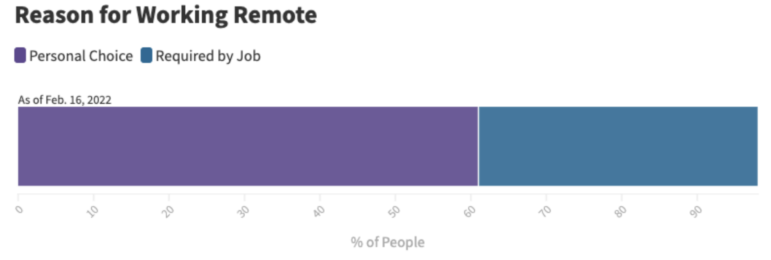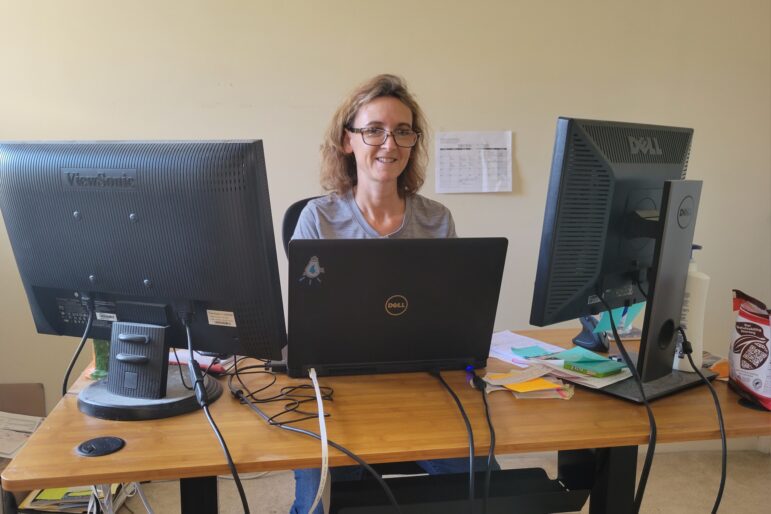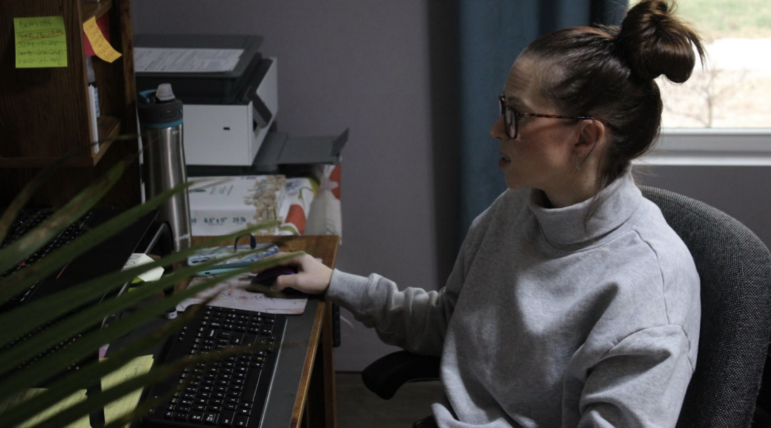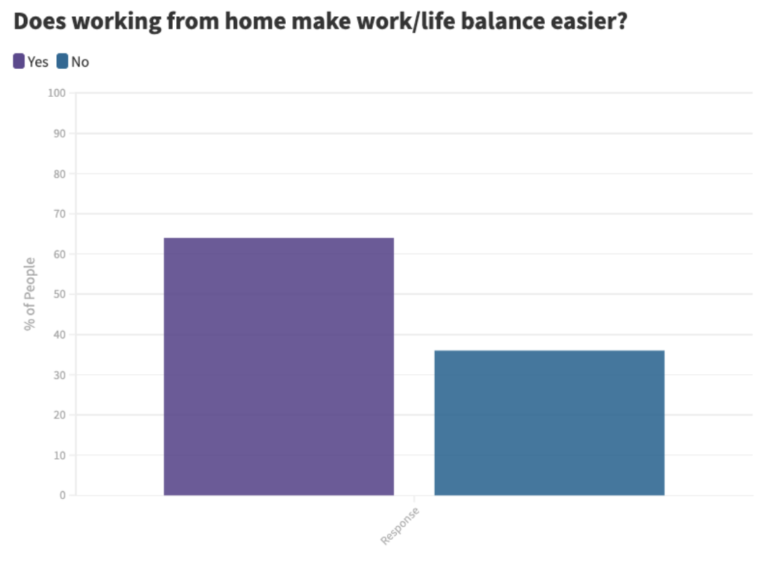In 2020, workplaces across the country went online after the onset of the COVID-19 pandemic. Employees were patched together by networks of phone calls, texts, virtual meetings and online messaging. More than two and a half years later, remote work remains a staple of the modern workplace. What began as a necessity has slowly become a popular choice — one that some still favor over in-person work.

Why do people work remotely?
According to the Pew Research Center, 61% of U.S. workers work from home because they prefer it, not because their workplace is closed. This data was taken from a sample of nearly 6,000 Americans, and this trend is reflected in Ingham County.

Lori Warren, a senior software engineer, has been working at Auto-Owners Insurance for 25 years. After the pandemic, Warren’s position transitioned to full-time remote but she has recently been required to visit the office once a month.
“I can go more in more to the office if I wanted to, and there are people that actually can work full time remotely but they choose to go in once a week,” Warren said. “I choose to try to find that connection outside of work.”
Christian Martin graduated from MSU this past spring and works as an actuarial associate at Segal. In the job hunt, Martin specifically searched for remote jobs. Segal offered Martin to work hybrid, but he chose to work remotely full-time.

Martin said, “There’s no reason for me to come in when all my coworkers are at home. … I don’t particularly want to be stuck in one place; in this time of my life all of my friends are moving away for jobs or grad school.”
Martin plans to move to Seattle next in January, closer to friends and will continue to work remotely.
Work vs. personal life
Pew found that 64% of employees who did not work remotely before the pandemic but do now, say it’s easier to balance work and their personal life.
Betsy Myers, an HR assistant for Ingham County, put her house up for sale while she was working remotely. While potential buyers viewed her home, she was working. Myers’ remote job gave her flexibility.
Myers said, “I had internet in my car. … I have earbuds; I would sit in my car and listen to my meeting while people were looking at my house.”

Myers occasionally visits her parents in the afternoon and finishes up her workday there as well.
According to Pew, 44% of remote workers say working from home has made it easier for them to get their work done and meet deadlines, while only 10% say it’s been harder.

Warren finds that working from home is less distracting, and she’s able to be more productive. It’s difficult to focus with coworkers sitting so closely having conversations or others asking non-work related questions, she said.
Working from any location
Mark Malinowski, product manager at General Motors, works from his home in Riverview, Michigan. He works with clients from China, Korea and other locations in different time zones, so much of his work takes place in the early morning or late at night. Working remotely gives him flexibility between these meetings.
Malinowski said, “If I need to do a load of wash or if I need to quickly run to the store, I do have that freedom to do that … which really didn’t exist before we all ended up in this remote work situation.”
Malinowski didn’t always enjoy working remotely, but now thinks differently.
“After three or four months, the light went on … this really does have some benefits,” he said. “You do have freedom. You’re not fighting traffic. You can plan your day a little more efficiently.”
Steve Dorsey, former vice president of content innovation and development at Gannett, managed remote design teams in multiple time zones. Dorsey said in-person work required infrastructure such as generators which power rows of work computers in the event of a power outage— a cost that doesn’t exist for a remote workforce.
Dorsey said, “There’s a strength to sort of diverse geographic displacement of the team, so you’re always going to get things done because not everyone’s going to be affected — unless it’s a massive blackout or internet outage.”
Dorsey also named employees being able to live wherever they want as another advantage.
Still, remote work isn’t perfect.
According to Pew, 60% of remote workers say they feel less connected to their coworkers now.
Meenu Sundararaju, a software developer, joined Amazon in 2020 working fully remotely. She felt that onboarding was difficult as she wasn’t able to form relationships with coworkers and didn’t feel comfortable enough to ask questions.
However, remote workers ultimately find a way to connect. Sundararaju and her coworkers will go into the office once every two months.
Sundararaju said, “Typically we’ll all try to pick one day; it’s been a very long time since we’ve seen each other. That just gives us a little way of connecting.”
Myers, who said she is a very social person, balances her work and social life with dinners with friends, workout classes and socializing with other moms at sporting events for her kids.
Remote work can also be tough on supervisors. Dorsey found challenges while trying to build a community among employees.
Dorsey said, “Finding ways to help people connect and feel part of a team is really hard. This is a funny example, but one time we tried to buy cookies for 20 or so people to kick off a project with a big meeting we were having, and it proved to be kind of challenging. There’s no easy way to do that [remotely].”
Malinowski said, “I do feel sorry for people who are really in the early stages of their career and have missed out on the networking piece of just being seen in the office: understanding what other functions do in the company and then getting an understanding of, ‘Hey, maybe that’s something I’d like to try and get into.’”
While Warren said it’s harder to focus in the office around her coworkers, she said there is value to being within reach of her colleagues that she’s missing out on while working remotely.
Warren said, “Sometimes you overhear conversations that are work-related that we would know nothing about working from home. It kind of goes both ways.”